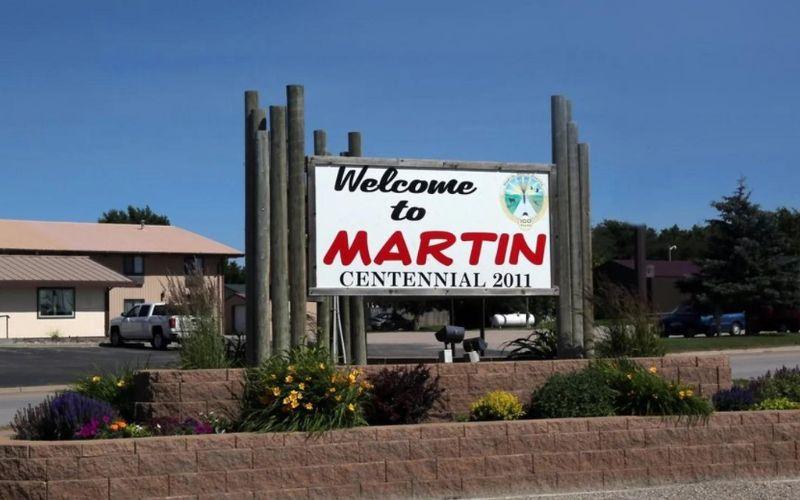South Dakota City Asks Oglala Sioux Tribe to Waive Sovereign Immunity to Fulfill Records Request


The Tribe, represented by the NARF, ACLU of South Dakota, and Public Counsel, is appealing the City of Martin’s actions to the South Dakota Office of Hearing Examiners.
“The City of Martin’s attempt to block the Tribe from obtaining public documents about its redistricting process is alarming given the long history of voting violations against Native Americans in South Dakota. NARF will continue to join with Tribes to resist,” Samantha Kelty, NARF senior staff attorney, said in a statement.
“The Oglala Sioux Tribe understands it may have to pay a reasonable fee for the records it requested, but charging attorney fees is simply not reasonable,” OST President Frank Star Comes Out said in statement. “The City of Martin has no legal right to charge Native Americans a higher rate for copies of public records. The Tribe will not stand by while the city attempts to put up these illegal roadblocks. The Tribe demands the same transparency to which every other member of the public is entitled.”
Charging a reasonable fee for city staff time to fulfill a public records request is permissible. The City of Martin, however, did not calculate a potential fee and simply stated that the “request may cost many, many hours of both attorney and city employee time.”
Charging attorney fees is not allowed under South Dakota law. South Dakota law also does not require Tribes to waive sovereign immunity to obtain public records.
The Tribe first made a request on Aug. 25, 2023, for records relating to potential violations of the Voting Rights Act of 1965. The records requested span 20 years and include election results, redistricting maps, agendas from meetings where redistricting was discussed, any and all analysis of Section 2 of the Voting Rights Act, and more.
The city denied the request on Sept. 11, 2023. A letter penned by the cit’s attorney’s, Gunderson, Palmer, Nelson & Ashmore, LLP, stated, “[i]f full payment is not received upfront,” the city requires the Tribe to “waive sovereign immunity to account for the possible non-payment of the requested materials. The Oglala Sioux Tribe must include the waiver in its written confirmation that it will pay the associated fee for gathering the twenty years of records.”
The letter also stated the hourly cost to acquire the requested materials could total nearly $500, between attorney’s fees and hourly wage for city employees.
“Imposing attorney fees on public records requests will act as a deterrent, rendering them financially inaccessible to the vast majority of the public,” Mustafa Filat, Justice Catalyst Fellow at Public Counsel’s Opportunity Under Law Project, said in a statement.
On Nov. 29, 2023, The Oglala Sioux Tribe objected to the city’s conditions outlined in the letter. On Dec. 9, 2023, the city issued a statement affirming its stance.
The Tribe has since reduced the request from 20 years of records to 10 years of records.
“In a democracy, people are entitled to information about the work the government is carrying out on their behalf. The Oglala Sioux Tribe is no different,” Stephanie Amiotte, ACLU of South Dakota legal director, said in a statement. “But the city’s conditions are unreasonable, not grounded in South Dakota law, and undermine the objective of governmental transparency at the heart of the public records request process. The city’s conditions also treat Tribes in South Dakota differently than other requesters who are making public records requests.”
“The requests are vague and broad, leaving it difficult for a layperson to determine whether a statutory exception applies,” Sara Frankenstein, an attorney representing the City of Martin, told The Rapid City Journal . “Many of the requests require legal analysis as to whether the documents sought are excluded from public disclosure pursuant to South Dakota law. Additionally, the request sought documents spanning over twenty years. Such a huge and broad request is taxing on the City of Martin’s resources and its citizenry. The City of Martin is small, and resources are thin.”
The city asked that the Tribe wave its sovereign immunity — which protects it from both private and commercial lawsuits, like any other nation — to ensure the request would be paid should it be fulfilled.
The Tribe is appealing to the South Dakota Office of Hearing Examiners, alleging the conditions sought by the City of Martin are unreasonable at best or were sought in bad faith at worst.




Looks like the "Plains States" still haven't caught on to the fact that Fed and State laws apply to ALL U. S. Citizens - which includes sovereign Tribal Nations.
SD and ND (as described in Kavika's thread regarding ND's voting violations) have been contentious toward the Indian Tribes/Nations being allowed to receive the exact, same treatment under the law as do non-Indian citizens.
It's the FRIGGIN' LAW people - learn how to follow it and quit playing your damn bias games with people's rights.
Martin SD has a population of around 1,000 and is surrounded on three sides by the Rosebud and Pine Ridge Sioux reservations. No matter they have to follow the law and that means producing the documents. End of story for the town.